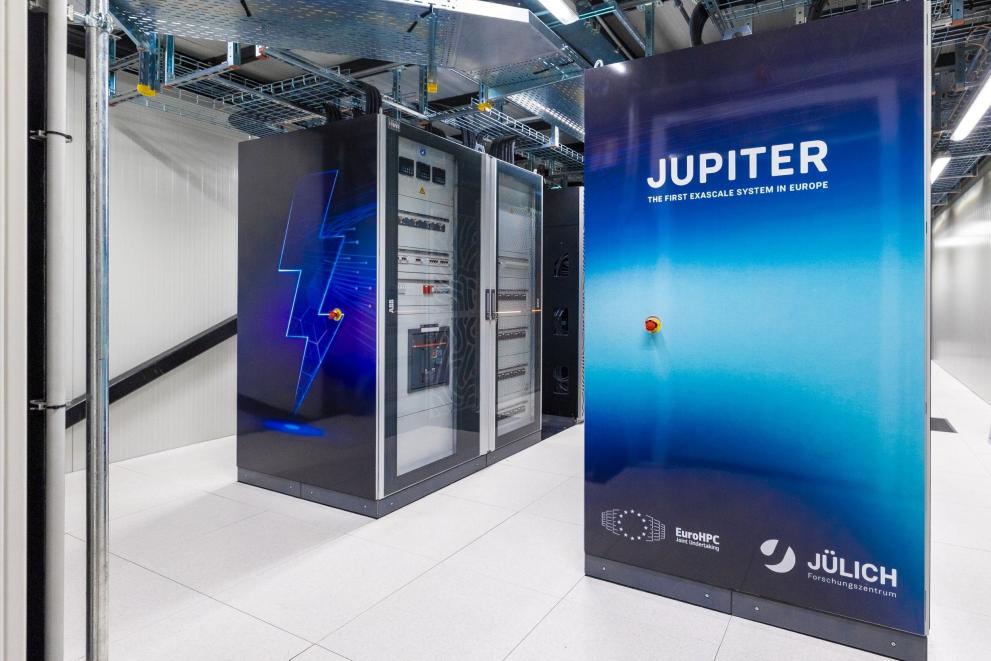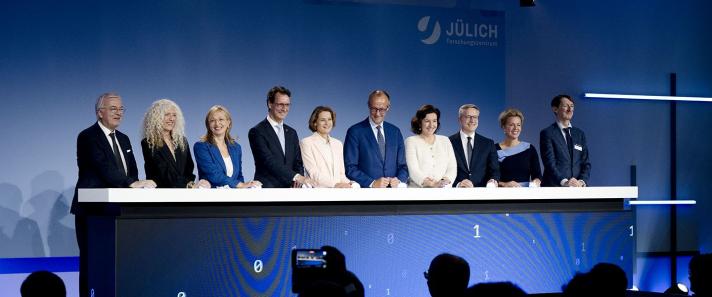
The event was also attended by high-ranking guests from politics, science, and industry including Hendrik Wüst, Minister-President of North Rhine-Westphalia; Roberto Viola, Director-General for Communication Networks, Content and Technology, at the European Commission (DG CNECT); Rafal Duczmal, Chair of the EuroHPC Joint Undertaking (EuroHPC JU) Governing Board; and Anders Jensen, the EuroHPC JU Executive Director.
Designed by the Jülich Supercomputing Centre (JSC) at Forschungszentrum Jülich in collaboration with EuroHPC JU and procured by EuroHPC Joint Undertaking, JUPITER stands as the first European supercomputer capable of performing one exaflop, which is equivalent to one billion times one billion calculations per second (1 ExaFLOP/s). It is also the most powerful system in Europe, combining outstanding performance with exceptional energy efficiency.
It would take every person on Earth performing one calculation per second over four years to match what JUPITER can accomplish in a single second. This next-generation supercomputer represents a major leap in European technology and its unprecedented computing capacity will have a substantial impact on scientific progress across Europe. It will bolster European competitiveness and technological sovereignty, while pushing the frontiers of scientific simulations and facilitate the development of advanced AI models for socially relevant applications, ranging from medicine and highly precise climate and weather forecasts to the optimisation of sustainable energy systems and multilingual European language models.
JUPITER will accelerate innovation and scientific discovery across Europe with access open to all users via the EuroHPC access calls. The allocation of the computing resources is jointly managed by the EuroHPC JU and the Gauss Centre for Supercomputing.
This access will follow the successful rollout of the JUPITER Research and Early Access Program (JUREAP), which in recent months empowered more than 30 lighthouse projects, 15 of which were selected by EuroHPC JU, to explore and optimise their applications on the system. Through early access to JUPITER’s cutting-edge infrastructure, European researchers were able to push the limits of performance, experiment with next-generation hardware and software technologies, and fine-tune their codes for peak efficiency. The participating projects covered a wide range of domains from chemical sciences and computational physics to earth system modelling, engineering, and large-scale AI ensuring that JUPITER will deliver transformative impact across European science and industry from day one.
Anders Jensen, EuroHPC JU Executive Director stated:
" With JUPITER, Europe is entering the exascale era, unlocking unprecedented computing power to drive scientific discovery, industrial innovation, and technological sovereignty. I look forward to see the first wave of exascale applications and the breakthroughs they will bring. "
Prof. Dr. Dr. Thomas Lippert, Director of the Jülich Supercomputing Centre added:
“After a decade of intensive innovation efforts, we have collaboratively developed a system that not only sets new standards in computational performance but will fundamentally change scientific research across numerous fields. The most complex AI models can now be trained and applied – something that was not possible without JUPITER.”
More details
Based on Eviden’s latest BullSequana XH3000 architecture, JUPITER Booster is equipped with approximately 24,000 NVIDIA GH200 Grace Hopper Superchips, specifically optimised for computationally intensive simulations and the training of AI models. This cutting-edge architecture enables JUPITER to achieve up to 80 ExaFLOP/s AI performance, with 8 bit precision and sparse matrices, making it one of the world’s fastest systems for Artificial Intelligence.
Composed of highly energy-efficient partitions, JUPITER is also setting new standards in sustainability and stands out as one of the most energy-efficient systems in the world. Thanks to its highly efficient warm-water cooling system, the supercomputer is designed to reuse the heat it generates during operation to heat buildings. For this purpose, it will be integrated into the heating network of the Jülich campus.
JUPITER, short for “Joint Undertaking Pioneer for Innovative and Transformative Exascale Research”, is fully owned and co-funded half by the European High Performance Computing Joint Undertaking (EuroHPC JU). The remaining half is funded equally by the German Federal Ministry of Research, Technology and Space (BMFTR, formerly BMBF) and the German Ministry of Culture and Science of the State of North Rhine-Westphalia (MKW NRW).
Next steps
Later this year, JUPITER will be complemented by the JUPITER AI Factory (JAIF) , selected in March 2025 as part of the EuroHPC JU’s initiative to establish AI Factories across Europe, to support industry, particularly start-ups and small and medium-sized enterprises (SMEs), to harness its power to develop powerful, secure AI applications that conform with data protection requirements.
Background
The EuroHPC JU is a legal and funding entity that brings together the European Union and participating countries to coordinate efforts and pool resources with the objective of making Europe a world leader in supercomputing.
To equip Europe with a cutting-edge supercomputing infrastructure, the EuroHPC JU has already procured 11 supercomputers, distributed across Europe. Three of these EuroHPC supercomputers are now ranked among the world’s top 10 most powerful supercomputers: JUPITER in Germany ranks at 4, becoming Europe’s new fastest supercomputer along with LUMI in Finland (9th place), Leonardo in Italy (10th place).
European scientists and users from the public sector and industry can benefit from EuroHPC supercomputers via the EuroHPC Access Calls no matter where in Europe they are located, to advance science and support the development of a wide range of applications with industrial, scientific and societal relevance for Europe.
Currently, the EuroHPC JU is also overseeing the implementation of 13 AI factories across Europe that offer free, customised support to SMEs and startups, JAIF being one them.
Additionally, the EuroHPC JU is deploying a European Quantum Computing infrastructure, integrating diverse European quantum computing technologies with existing supercomputers.
The EuroHPC JU also funds research and innovation projects to develop a full European supercomputing supply chain, from processors and software to applications to be run on these supercomputers and know-how to develop strong European HPC expertise.
Details
- Publication date
- 5 September 2025
- Author
- European High-Performance Computing Joint Undertaking
